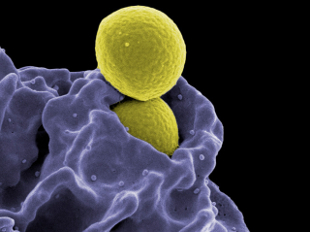Editor’s summary
Healthcare-associated infections are a leading threat to patient safety during hospital stays, and strategies to prevent such infections are lacking. Here, Yan et al. developed a protein-free vaccine, composed of aluminum hydroxide, monophosphoryl lipid A, and fungal mannan, that stimulates the innate immune system and confers protection against several common nosocomial pathogens including methicillin-resistant Staphylococcus aureus and vancomycin-resistant Enterococcus faecalis. Vaccine efficacy was dependent upon monocytes and macrophages and caused epigenetic remodeling in those cells. Protection conferred by the vaccine lasted up to 28 days post vaccination, suggesting it could ultimately be administered to patients at the beginning of a hospital stay and keep them from acquiring infections. –Courtney Malo
Abstract
Traditional vaccines are difficult to deploy against the diverse antimicrobial-resistant, nosocomial pathogens that cause health care–associated infections. We developed a protein-free vaccine composed of aluminum hydroxide, monophosphoryl lipid A, and fungal mannan that improved survival and reduced bacterial burden of mice with invasive blood or lung infections caused by methicillin-resistant Staphylococcus aureus, vancomycin-resistant Enterococcus faecalis, extended-spectrum beta-lactamase–expressing Escherichia coli, and carbapenem-resistant strains of Acinetobacter baumannii, Klebsiella pneumoniae, and Pseudomonas aeruginosa. The vaccine also conferred protection against the fungi Rhizopus delemar and Candida albicans. Efficacy was apparent by 24 hours and lasted for up to 28 days after a single vaccine dose, with a second dose restoring efficacy. The vaccine acted through stimulation of the innate, rather than the adaptive, immune system, as demonstrated by efficacy in the absence of lymphocytes that were abrogated by macrophage depletion. A role for macrophages was further supported by the finding that vaccination induced macrophage epigenetic alterations that modulated phagocytosis and the inflammatory response to infection. Together, these data show that this protein-free vaccine is a promising strategy to prevent deadly antimicrobial-resistant health care–associated infections.







